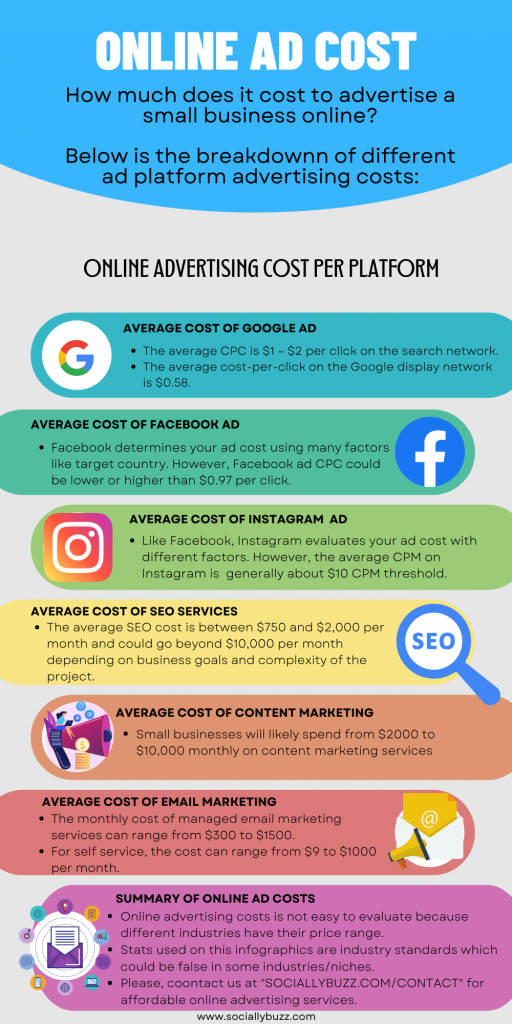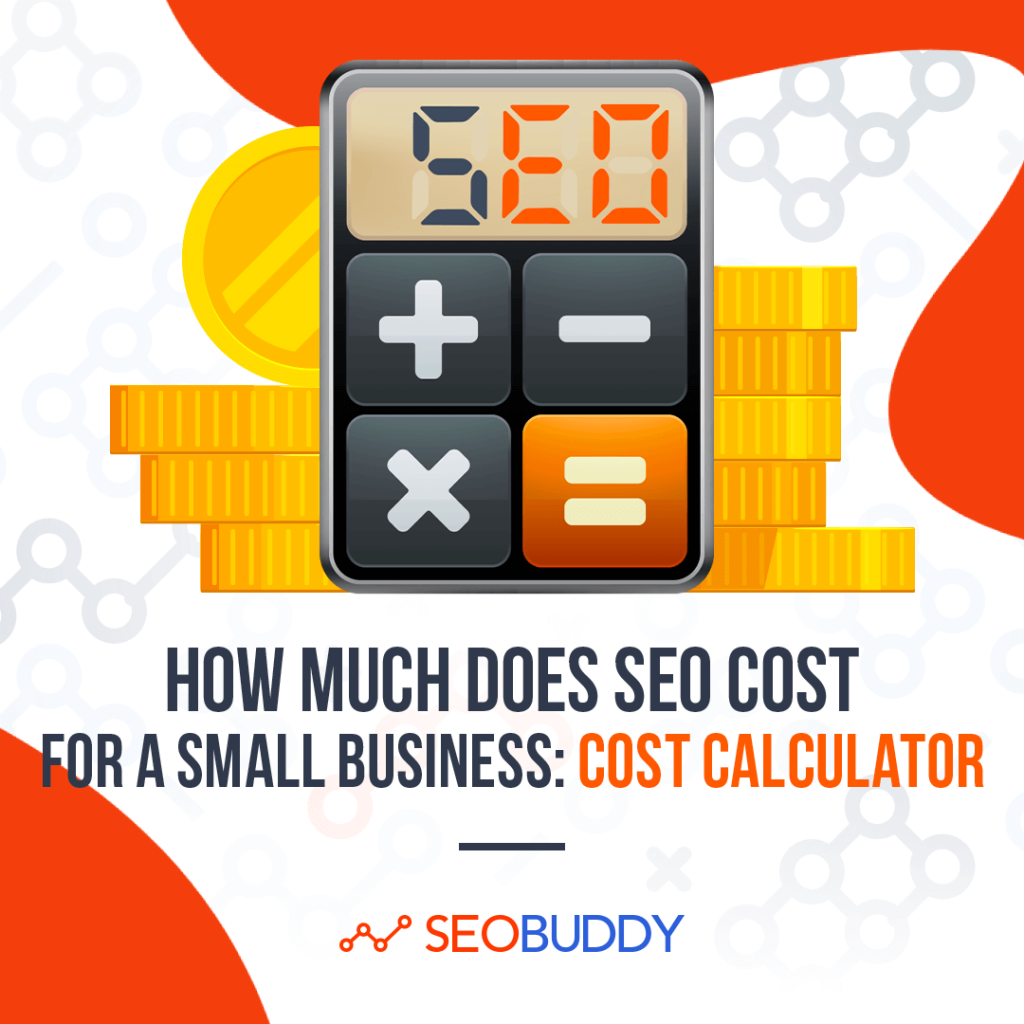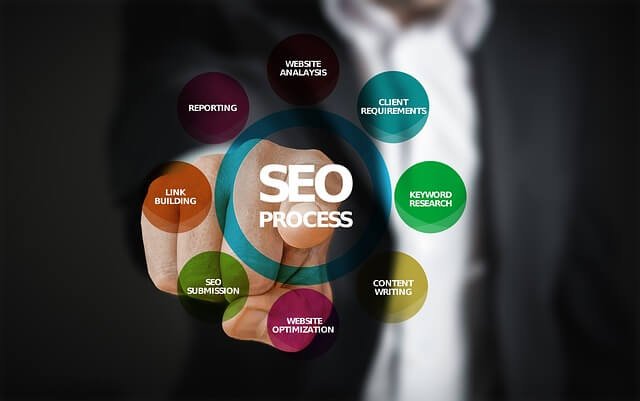SEO costs for small businesses range from $500 to $5,000 per month, depending on services. Tailor your budget by prioritizing goals and selecting essential strategies.
Understanding SEO expenses is crucial for small business owners. As you grow, investing in SEO can boost visibility and attract more customers. Yet, determining a monthly budget for these services can be confusing. How much should you actually spend? This question often puzzles many business owners.
The cost of SEO depends on factors like the scope of work, the expertise of the agency, and the competitiveness of your industry. By knowing what influences these costs, you can make informed decisions. In this blog, we’ll break down the factors affecting SEO pricing and help you understand what to expect.

Credit: www.sociallybuzz.com
Seo Pricing Models
Understanding SEO pricing models is essential for small business owners. Different models suit different needs and budgets. Knowing the options helps you make an informed decision.
Hourly Rates
Some SEO experts charge by the hour. This model is flexible. You pay for the actual time spent on your project. Hourly rates can vary widely. Expect to pay between $75 to $200 per hour. The cost depends on the expert’s experience and location. Hourly rates work well for short-term projects. They are also good for consultations or specific tasks. Keep track of hours to avoid surprises.
Monthly Retainers
Monthly retainers are common in the SEO industry. You pay a fixed amount every month. This model ensures consistent work on your SEO. Prices range from $500 to $5,000 per month. The cost depends on the scope of services. Monthly retainers often include ongoing optimization, reporting, and support. This model suits long-term goals. It also helps build a steady relationship with your SEO expert. Monthly retainers provide predictable costs, making budgeting easier.
Factors Influencing Seo Costs
Understanding the factors influencing SEO costs can help small businesses budget effectively. Several key elements determine the monthly expense of SEO services. Let’s explore these factors to provide clarity on what small businesses can expect.
Business Size
The size of your business plays a crucial role in SEO costs. Small businesses often have limited budgets compared to larger enterprises. Smaller websites may need fewer resources and less time to optimize. Larger businesses typically require more extensive SEO efforts due to their vast content and complex structures.
Small businesses with fewer pages can expect lower costs. Managing a smaller site is less time-consuming. Conversely, larger websites need more extensive keyword research and content creation. This increases the overall cost of SEO services.
Competition Level
The level of competition in your industry affects SEO pricing. High competition means more effort is required to rank well. Industries with intense competition need comprehensive strategies. This includes more in-depth keyword research and high-quality content.
Less competitive niches often require fewer resources. They may see results with a smaller investment. Competitive markets demand ongoing efforts to maintain and improve rankings. This increases monthly SEO costs for businesses in such sectors.
Diy Vs. Professional Seo
Choosing between DIY and professional SEO can be challenging for small businesses. Each option has its own set of benefits and drawbacks. Understanding these can help in making the right decision for your business’s needs.
Pros And Cons
Both DIY and professional SEO have their unique advantages and disadvantages.
DIY SEO:
- Pros:
- Lower cost
- Full control over strategies
- Improves learning and skills
- Cons:
- Time-consuming
- Requires constant learning
- Risk of mistakes
Professional SEO:
- Pros:
- Expert knowledge
- Time-saving
- Access to advanced tools
- Cons:
- Higher cost
- Less control over strategies
- Dependent on agency performance
Cost Comparison
The cost of DIY versus professional SEO varies significantly. Here’s a comparison:
| SEO Type | Estimated Monthly Cost |
|---|---|
| DIY SEO | $0 – $300 |
| Professional SEO | $500 – $5,000 |
DIY SEO can be very economical. It may only require a few tools and resources. These can range from free to a few hundred dollars per month. Examples include keyword research tools, analytics software, and online courses.
Professional SEO, on the other hand, involves hiring experts or agencies. These professionals charge for their expertise and time. Monthly costs can range from $500 to $5,000. This depends on the size of your business and the scope of services.
Both options have their place. DIY SEO might be suitable for those with limited budgets. Professional SEO could be the better choice for those wanting comprehensive and efficient results.
Budget-friendly Seo Strategies
Small businesses often struggle with tight budgets. Yet, they still need effective SEO. Budget-friendly strategies can help. These strategies maximize results without breaking the bank. Let’s explore how content creation and social media integration can help.
Content Creation
Content is king. High-quality content can boost your SEO. Create blog posts, articles, and guides. Focus on topics your audience cares about. Use keywords naturally within the text. This helps search engines understand your content. Update your content regularly. Fresh content keeps your site relevant. It also attracts more visitors.
Incorporate images and videos. Visual content makes your posts engaging. It can also improve your site’s ranking. Use descriptive alt texts for images. This helps search engines index your visuals. Keep sentences and paragraphs short. This improves readability. Make sure your content is easy to understand.
Social Media Integration
Social media can boost your SEO efforts. Share your content on social platforms. This increases its visibility. It also drives traffic to your site. Engage with your audience on social media. Respond to comments and messages promptly. This builds trust and loyalty.
Use hashtags wisely. They help categorize your content. They also make it easier to find. Collaborate with influencers. They can help spread your content. This increases your reach. Ensure your social media profiles are complete. Include links to your website. This helps drive more traffic to your site.
Choosing An Seo Agency
Choosing an SEO agency can be a daunting task for small businesses. You want to make the right decision to ensure your investment pays off. The right agency can improve your online presence and drive more traffic to your site. But how do you choose the right one? This section will guide you through the process.
Research Tips
Start by researching potential SEO agencies. Look for agencies with a good track record. Check their reviews and testimonials. See what their previous clients say about their services. This will give you an idea of their reliability.
Visit their website. Look for case studies and client success stories. These can show how effective their strategies are. Also, see if they rank well in search results. An agency that ranks well might be able to do the same for you.
Questions To Ask
Prepare a list of questions to ask potential agencies. Start with basic questions about their experience. Ask how long they have been in business. Find out if they have worked with businesses like yours before.
Inquire about their SEO strategies. Ask how they plan to improve your rankings. Make sure their methods are ethical and follow best practices.
Finally, ask about their pricing. Understand what you will be paying for each month. Make sure there are no hidden fees. Choose an agency that fits your budget and needs.

Credit: thinkpodagency.com
Understanding Roi
Understanding the return on investment (ROI) for SEO is crucial for small businesses. You want to know if the money spent will bring value. SEO costs can vary, but knowing the potential ROI helps make informed decisions. This section will explain how to measure success and the long-term benefits of investing in SEO.
Measuring Success
Track your website traffic to measure SEO success. Use tools like Google Analytics. Check the number of visitors and their behavior. Look at metrics like bounce rate and average session duration.
Conversions are another key metric. This includes sign-ups, sales, or any goal completion. Compare these metrics before and after your SEO efforts. This will give you a clear picture of your progress.
Keyword rankings help gauge your SEO performance. Higher rankings mean more visibility. More visibility often leads to more traffic and conversions.
Long-term Benefits
SEO is not a quick fix. It offers long-term benefits. Once your website ranks higher, it attracts continuous traffic. This leads to consistent leads and sales.
High-ranking websites build trust and authority. People tend to trust organic search results more. This trust can convert visitors into loyal customers over time.
SEO also improves user experience. A well-optimized site is easy to navigate. This keeps visitors engaged and reduces bounce rates.
Investing in SEO now can save money in the future. Paid ads offer short-term gains. SEO provides sustainable growth.
Common Seo Services For Small Businesses
Small businesses often need help to make their websites visible. SEO services can help with this. These services can be complex. They involve many tasks that work together. This helps improve the site’s ranking on search engines. Let’s look at some common SEO services for small businesses.
Keyword Research
Keyword research is the first step in any SEO plan. It helps find words that people use to search for services or products. These keywords should be relevant to the business. Using the right keywords helps attract the right audience. This can lead to more traffic and more sales.
On-page Optimization
On-page optimization is about improving the website itself. This means making sure each page is easy to read. It also means using the right keywords in the right places. Titles, headers, and meta descriptions are key areas. Clear and simple content is also important. This helps search engines understand what the site is about.
Hidden Costs In Seo
When planning your SEO budget, consider the hidden costs. These are often overlooked and can affect your overall expenses. Understanding these costs helps you manage your budget better.
Additional Tools
SEO often requires the use of additional tools. These tools help with keyword research, backlink analysis, and performance tracking. Many of these tools come with a monthly subscription fee.
| Tool | Cost per Month |
|---|---|
| Ahrefs | $99 |
| SEMrush | $119 |
| Moz Pro | $99 |
Keyword research tools and analytics tools are crucial. They add value but also add cost. Be prepared for these expenses in your budget.
Unexpected Expenses
SEO can have unexpected expenses. These might include penalties from search engines. If your website has issues, you may need to pay for fixes.
- Penalty Recovery: Costs can vary.
- Website Audits: Usually between $500 and $5000.
- Content Updates: This can cost $50 to $500 per page.
Such costs are not always predictable. But being aware of them helps you prepare. Always set aside a portion of your budget for these potential expenses.
Monitoring And Adjusting Your Seo Budget
Monitoring and adjusting your SEO budget is essential for small businesses. Staying on top of your SEO expenses ensures you get the best results. This involves regular audits and adapting to changes in the digital landscape. Below, we will discuss these steps in detail.
Regular Audits
Conducting regular audits helps you track your SEO progress. It allows you to see which strategies are working and which are not.
- Monthly Reports: Review your monthly SEO reports. Look at traffic, rankings, and conversions. This will help you understand the ROI of your SEO efforts.
- Performance Metrics: Focus on key metrics like click-through rates, bounce rates, and average session duration. These numbers tell you how well your website is performing.
- Competitive Analysis: Compare your website with competitors. Identify gaps and opportunities where you can improve.
Adapting To Changes
SEO is constantly evolving. Adapting to changes ensures your strategy remains effective.
- Algorithm Updates: Search engines frequently update their algorithms. Stay informed about these updates. Adjust your strategies accordingly.
- Market Trends: Market trends can influence your SEO strategy. Keep an eye on industry changes and consumer behavior. Adapt your content to meet new demands.
- Budget Allocation: Adjust your budget based on performance. Allocate more funds to high-performing strategies. Reduce spending on ineffective tactics.
By monitoring and adjusting your SEO budget, you ensure optimal use of your resources. Regular audits and adapting to changes help you stay ahead in the digital world.

Credit: seobuddy.com
Frequently Asked Questions
How Much Does Seo Cost Monthly?
SEO costs for small businesses typically range from $500 to $2000 per month. Prices vary based on services, competition, and agency expertise.
What Factors Affect Seo Pricing?
SEO pricing is influenced by factors such as business size, industry competitiveness, project scope, and the agency’s experience.
Is Seo Worth The Investment?
Yes, SEO is worth it. Effective SEO improves search rankings, increases organic traffic, and boosts business visibility and revenue.
Do Seo Costs Vary By Location?
Yes, SEO costs can vary by location. Local market conditions and competition can influence pricing for small businesses.
Conclusion
SEO costs for small businesses can vary widely. Budget, goals, and services matter. A typical range is $500 to $5,000 per month. Smaller budgets can still see benefits with focused strategies. Investing in SEO boosts online visibility and growth. Choose a plan that fits your needs and budget.
Remember, SEO is a long-term investment. It pays off with patience and consistency. Evaluate your options and track results. Your business deserves the best chance to thrive online.

